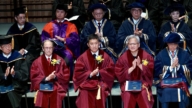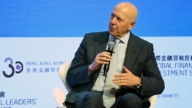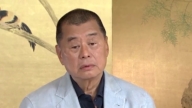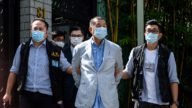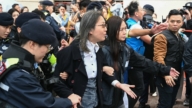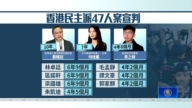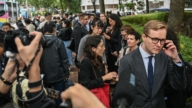【新唐人2013年03月16日訊】「香港人願意投票支持回歸英國管治嗎?」香港《南華早報》日前推出這項網上民意調查,目前已經有92%的網民選擇「願意」。評論認為,中國特色的社會主義,對香港同胞沒有吸引力。而這項民調的結果,正是香港人對北京一再干預香港事務的反彈。
《南華早報》的民意調查,表達了香港多數人的心聲,至於會不會成為改變香港未來的起點?有網友說,中共的洗腦教育,只令港人更厭惡中國,中國不改變,總有一天,香港會偋棄這個民族身份。
香港作家張成覺:「從投票的情況可以看出甚麼呢,就是中國特色的社會主義,對香港同胞是沒有吸引力,這是一種集權制度,就是極少數的權貴在壟斷一切,人民大眾根本沒有權。」
香港《動向》雜誌主編張偉國:「有很多人對共產黨的統戰,對所謂的一國兩制,對北京的所謂『北大人』說不。不管他是投票重新成為英國的殖民地,還是說香港獨立,還是說香港以其他的情勢,自己發展。都是表達老百姓對共產黨的一種反對、抵觸、抗爭。他們要選擇自己的道路,所以這點來講,應該是很正常的。」
香港回歸大陸之前,中共和英國簽署了《中英聯合聲明》,聲明第三條第(二)項規定:「除外交和國防事務屬中央人民政府管理外,香港特別行政區享有高度的自治權。」中共向英國和香港人保證,香港原有的資本主義制度不變,保持香港的經濟繁榮和社會安定,五十年不變。
張偉國:「原來承諾的普選,一而再、再而三的拖,而且改變了這個內容,所以很多當時許下的承諾,都變成了空頭支票。香港人民在自己的實踐生活當中,看到了共產黨的真實面目。看到了香港像被清水煮蛙一樣,一步一步的變成大陸的一個新的殖民地。」
有評論指出,中共想掌控香港,不外乎兩條路:第一是透過建制精英、親共勢力間接管治香港﹔另一條是梁振英在走的路,就是消除所有反對力量、取代現有政商體系,中共直接治港。
張偉國:「香港人民都認識到他們的地位,他們的政治權利,他們的實際生活,都發生了巨大的變化。所以已經醒悟到,西藏的今天就是香港的明天,現在西藏如此慘烈的黑暗迫害,我相信香港人是無法忍受的。」
香港回歸以來,中共漸漸以行政主導,代替原有存在的三權分立﹔以人大釋法否決香港人雙普選的合法要求﹔以愛國者標準包辦特首選舉﹔以各種統戰手段侵蝕香港的新聞自由,現在更提出在2017年香港特首首次普選時,候選人必須經選舉委員會內部「預選」,以確保「篩走」北京中央政府不能接受的人選。換句話說,就是香港的行政首長由北京來欽定。
面對中共種種的政治干預,香港人忍不住了,他們要站出來抗爭。
「香港2013年民主呼聲」的第一響,由一向低調的法律學者戴耀廷教授開始,他在《信報》發表文章指出,要北京給予港人普選幾近天方夜譚,必須動用更大殺傷力武器──佔領中環行動,「以癱瘓香港的政經中心,迫使北京改變立場。」
然而作家陳雲卻不認同「佔領中環」爭取普選行動。他認為,佔領中環行動將會演變成「香港版天安門集會」。陳雲表示,北京天安門運動失敗之後,大陸民心潰散,最後的道德力量一次耗盡,以後民眾不存公義之心。而且官商勾結,不再理會政府集權。民眾在夾縫中謀利,賺夠錢就移民美國。
不過,香港作家陳婉蓉也表示,「自由民主若是共同幸福,爭取的過程也定當是共業。」
採訪/李韻 編輯/黃億美 後製/肖顏
Vote to Return to UK: 92% of Hongkongers Say “YES”
“Would Hongkongers vote to return to
a British overseas territory, given the option?”
This was an online poll launched by
Hong Kong’s South China Morning Post (SCMP).
92% of netizens have voted “YES”.
Political observers say that socialism with Chinese
characteristics is unattractive to the Hong Kong people.
The poll result represents Hong Kong people’s reaction to
the Chinese Communist Party(CCP) intervention in Hong Kong’s affairs.
The SCMP poll result is deemed to voice the
inner wishes of Hong Kong citizens.
Will it be a starting point for a change in the near future?
Netizens in China commented that CCP brainwashing
will only make Hongkongers disgusted with mainland China.
If CCP-ruled China remains unchanged, Hong Kong’s people
will finally renounce their Chinese citizenship.
(Hong Kong writer) Cheung Shing Kok: “The poll result
shows that socialism with Chinese characteristics is not attractive to Hong Kong compatriots.
It is a totalitarian regime, a handful of the rich and powerful
who have monopolized everything.
The masses of the people have no rights at all."
(Chief editor, Hong Kong Trend magazine) Zhang Weiguo:
“Lots of people have said No to the CCP’s United Front tactics, and to its “one country, two systems” policy.
So no matter whether Hong Kong will be voted to re-become
UK’s colony, or to declare its independence, or to separately develop itself in the future,
it will only be a reflection of Hong Kong people’s
opposition to the CCP, a sort of resistance.
They want to choose their own path.
I think it was a very normal reaction.”
Before Hong Kong’s return to mainland China, the CCP Regime
and UK jointly signed the Sino-British Joint Declaration.
In Article 3, Section (b), it states that
“In addition to the foreign and defense affairs which are
the responsibilities of the Central People’s Government,
the Hong Kong Special Administrative Region will
enjoy a high degree of autonomy."
The CCP authorities promised that Hong Kong’s previous
capitalist system will remain intact for 50 years, to sustain
economic prosperity and social stability in Hong Kong.
Zhang Weiguo: “The universal suffrage it promised has
been postponed again and again.
Also its content has been changed.
So many promises it made have now become lip-service.
In their daily lives, the Hong Kong people have come to
discern the CCP’s true face.
They have understood that Hong Kong is now like a frog in
warm water, gradually becoming a new colony under CCP rule.”
Media commentary indicated two options that the CCP
may make to realize control of Hong Kong.
1. indirectly governing Hong Kong through pro-CCP elites
and forces;
2. directly ruling Hong Kong, a path that CY Leung now takes.
That is, eliminating all opposition forces, and replacing
the existing political and commercial system.
Zhang Weiguo: “The people of Hong Kong have realized that
their original status, political rights, and real life have
undergone tremendous changes.
So they’ve awakened now that today』s Tibet is
Hong Kong’s tomorrow.
Tibet has undergone so much brutal persecution,
which is intolerable to the Hong Kong people, I think.”
After Hong Kong’s return to China, the CCP has gradually
replaced its tripartite system with executive-led governance.
The regime has ruled out dual universal suffrage in
Hong Kong with interpretation of Basic Law by the National People’s Congress.
It has monopolized the election of Hong Kong Chief Executive
with its own criteria of patriots.
Also, through various united-front means,
the CCP violates Hong Kong’s press freedom.
It has announced that in 2017 the first universal suffrage of
the Chief Executive, the candidates will only be generated through the Election Committee’s “pre-selection".
This will ensure the sifting out of candidates that
the Beijing regime disfavors.
In other words, CCP top leaders will handpick
the Hong Kong Chief Executive.
The CCP’s political interference has outraged
Hong Kong citizens. They have stood up and fought back.
The first ring came from Benny Tai Yiu Ting, a legal scholar.
The Hong Kong Economic Journal published his article.
The article said that it’s almost a fairy tale to get
Beijing’s promise of universal suffrage.
It needs Hongkongers to take more ambitious action ——
to occupy Hong Kong’s central business district.
“This is to paralyze Hong Kong’s political and economic center,
to force Beijing to change its position."
Writer Chen Yun disapproved of the “Occupy Central" proposal.
He remarked that the action will lead to
a Hong Kong version of Tiananmen Square rally.
Chen indicated that after the failure of Tiananmen pro-democracy
movement, morale was left shattered in the mainland.
The depletion of the last moral force resulted in
a shortage of morality among the public in China.
He adds that officials-business collusions have made
the mainlanders ignore the autocracy.
Civilians there have focused on making money
between millstones.
Once making enough money, they have opted to
emigrate to the U.S.
Hong Kong writer, Chen Wanrong, commented.
She said that “If free democracy is real public happiness,
the process of obtaining it is surely a public undertaking.”


